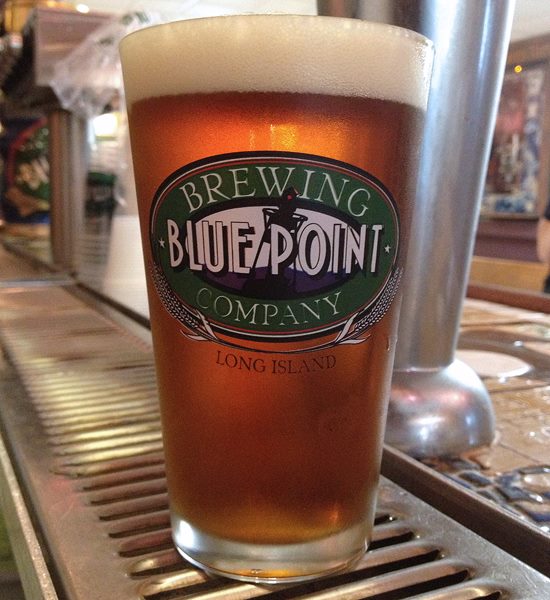
Blue Point Brewing Company, Long Island’s oldest and largest craft brewery, announced Wednesday that it has agreed to be purchased by international beer conglomerate Anheuser-Busch, in a deal that shocked many of the brewery’s devoted followers.
Terms of the agreement were not announced, but the purchase is expected to close in the early second quarter of 2014, according to a joint press release issued by both companies. It appears that the brewery’s co-founders, Peter Cotter and Mark Buford, will stay on, but to what extent is unclear. The brewery’s operations will remain in Patchgoue.
“We are deeply grateful to our family of loyal employees and customers,” Cotter said in the news release. “Our success was made possible by the hard work of good people and good beer in Patchogue.”
The release does not mention when negotiations began between the nation’s 34th-largest craft brewery and its new St. Louis-based parent company, which was sold to Belgian brewer InBev in 2008.
Anheuser-Busch said it plans to invest in the brewery to “grow its operational capabilities and enhance the consumer experience over the next few years.” Luiz Edmond, the company’s CEO, said the company looks forward to “preserving the heritage and innovation of the brands.”
The award-winning brewery opened in 1998 and became the first of more than a dozen microbreweries to open across Nassau and Suffolk counties in recent years. The craft beer revolution has swept the country, and especially on Long Island where the number of craft breweries have doubled since 2011.
Beer Here: Long Island’s Craft Beer Explosion
There are currently 14 craft breweries on the Island, with another, Moustache Brewing Company in Riverhead, now selling its hand-crafted brews at a local Farmers’ Market.
Many of the craft beers brewed on LI are primarily sold at local bars and distributors, but Blue Point has succeeded in distributing its portfolio of 40 beers in 15 states, including as far south as Florida.
Post-announcement, reactions on Blue Point’s Facebook page were mixed following a post by the company announcing: “We’re not going. We’re growing.” More than 100 reactions ranged from “congratulations” to anger and accusations of the Long Island original becoming a “sell out.”
“This is a GREAT decision by the brewery,” wrote one commenter.
Another said: “This sucks. One of my favorite beer companies sold out to the big man.”
One even joked that he’s waiting for commercials promoting a fictional beer, “toasted lager light,”—a dig at Anheuser-Busch’s vast assortment of light beer, most notably Bud Light.
Paul Leone, executive director of the New York State Brewers Association, said the news wasn’t surprising considering the recent local craft beer boom, adding that this was the largest purchase of a craft brewery in the state.
“With our craft beer growth in New York State, consolidation is expected,” he said. “I’m sure Blue Point did this with the best intentions.”
“It certainly is going to widen their distribution,” Leone added. “You only hope that the new folks that have it now don’t mess with the quality of the beer.”
Steve Pominski, founder and head brewer of Barrage Brewing in Farmingdale, the most recent brewery to open on LI, said the deal could be “far-reaching.”
“Now they have the resources maybe they weren’t able to have before or afford before,” said Pominski, who recalled visiting Blue Point’s tasting room the day it opened. “Blue Point’s kinda like the father figure where all the kids are spreading out.”
Mike Philbrick, who runs Port Jefferson Brewing Company and considers Cotter and Buford good friends, said that given their dedication to the product, he doesn’t see the quality of Blue Point’s beer suffering as a result of the deal.
“Just knowing those guys,” he said, “they’re incredibly concerned about how their fans react to anything they do, and they’re very grassroots. They started that brewery from nothing 15 years ago.”
Big beer companies like Anheuser-Busch have recently been trying to attract devoted craft beer enthusiasts by gobbling up successful microbreweries, like it did with Chicago-based Goose Island in 2011.
Leone says purchasing smaller companies, instead of trying to create their own unique craft brews, may be the best way for large beer corporations to stem the tide of America’s craft beer renaissance.
“If you can’t beat them, join them,” he said. “I think that’s their attitude.”






























